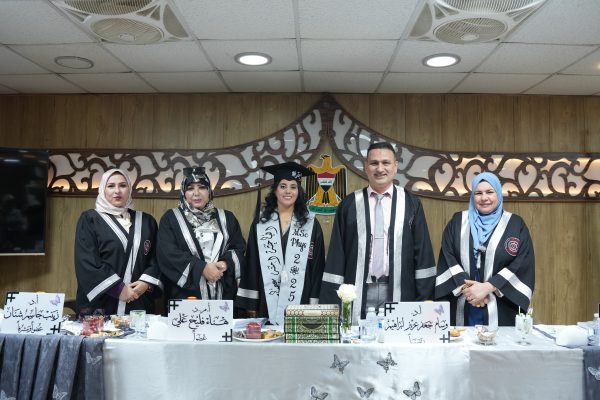Thesis Discussion
College of science for women/University of Baghdad examined the thesis entitled (Rapid synthesis of ZnO@ Al₂O₃ nanoparticles by microwave irradiation assisted plant extracts to study their properties for biological application.)
of the student: Amenah Isam Abdulateef
The thesis aims to use microwave irradiation and assisted green method that includes plants extracts (tea, coffee, rosemary) to synthesis ZnO, Al₂O₃ nanoparticles and for the first time, synthesis core@shell (ZnO@Al₂O₃) nanoparticles .it is a fast method, cost-effective, less hazardous, environmentally friendly, and non-toxic method, as samples are the synthesis in record time while minimizing pollution during preparation. to use in biological applications to evaluate the efficiency of the produced oxides nanoparticles in suppressing certain types of bacteria and fungi.
The thesis also includes: study the properties of nanoparticles for all prepared samples (ZnO, Al₂O₃ and ZnO@Al₂O₃). morphological characteristics (FE-SEM, EDX, AFM, TEM), structural characteristics (XRD), optical properties (UV-Vis, FTIR), and electrical properties (ZP) were used to determine the surface charge and stability of the NPs.
The prepared nanoparticles were used for biological application by tested their effectiveness in inhibiting bacteria (Gram-positive, Gram-negative) and fungi. ZnO, Al₂O₃ nanoparticles showed an effective activity of antimicrobial, In addition, to the strong activity of antimicrobial to (ZnO@Al₂O₃) nanoparticles due to the combination of the oxides properties. Consequently, the main conclusion of this study indicates the nanoparticles synthesis by microwave radiation and the green method of ZnO, Al₂O₃ using plant extracts (Tea, Coffee, Rosemary) and of ZnO@Al₂O₃ using Rosemary extract can be used as effective agents for inhibiting pathogenic microbes.
Final Grade: Excellent.










